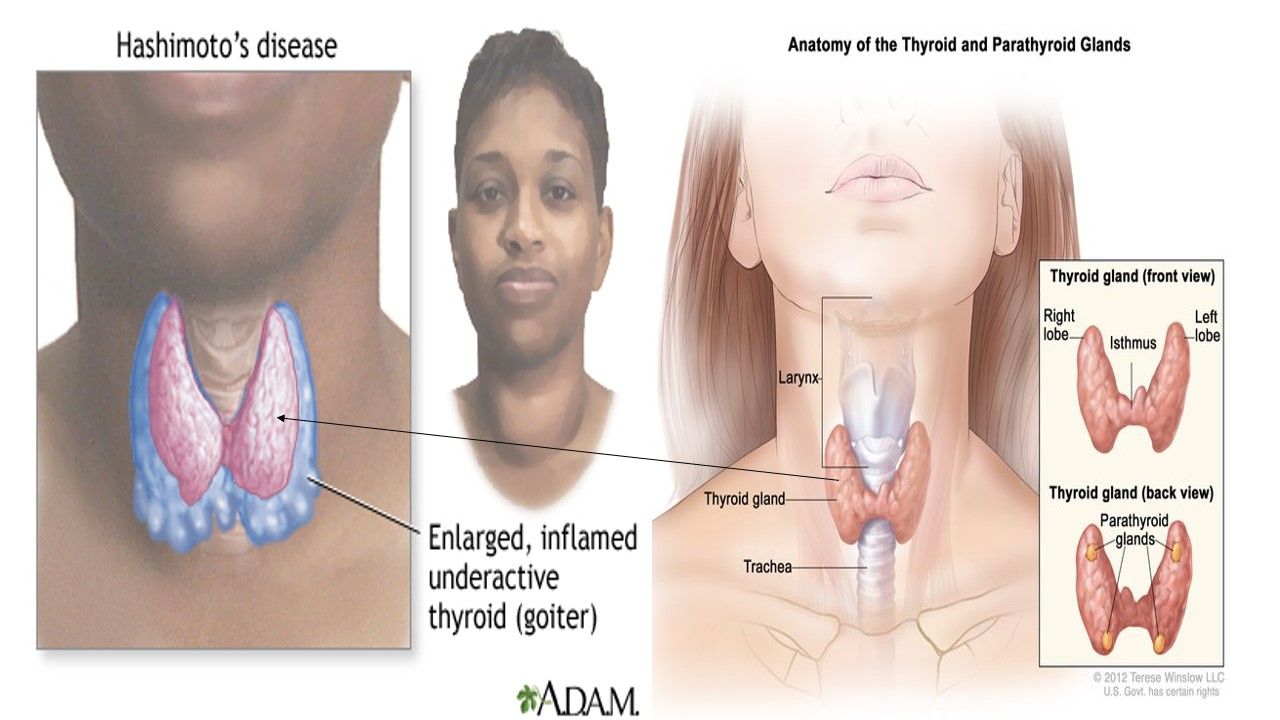Hashimoto's Disease

What is Hashimoto's disease?
Hashimoto's disease is a chronic autoimmune disorder that affects the thyroid gland, leading to inflammation and damage of the gland and resulting in decreased thyroid hormone production. This can cause a range of symptoms, including fatigue, weight gain, and depression.
Who's at risk for Hashimoto's disease?
Hashimoto's disease can affect anyone, but certain groups of people are at higher risk, including:
- Women, particularly those over the age of 60
- People with a family history of thyroid disease or autoimmune disorders
- People with a history of radiation exposure or other environmental factors that may damage the thyroid gland
What causes Hashimoto's disease?
Hashimoto's disease is caused by an abnormal immune response that leads to inflammation and damage of the thyroid gland, as well as to the cells that produce thyroid hormones. The exact cause of this abnormal immune response is not well understood, but it is thought to be triggered by genetic and environmental factors.
How does Hashimoto's disease start?
Hashimoto's disease typically starts gradually and may progress over several years, with symptoms developing slowly and often going unnoticed. In some cases, the condition may be triggered by a viral infection or other factors that cause inflammation or damage to the thyroid gland.
What are the symptoms of Hashimoto's disease?
The symptoms of Hashimoto's disease may vary depending on the severity and duration of the condition, but may include:
- Fatigue or weakness
- Weight gain or difficulty losing weight
- Sensitivity to cold
- Constipation
- Dry skin or hair loss
- Depression or mood swings
- Memory problems or difficulty concentrating
- Enlargement of the thyroid gland (goiter)
How is Hashimoto's disease diagnosed?
Diagnosing Hashimoto's disease involves a comprehensive evaluation of a person's symptoms, medical history, and physical exam, as well as diagnostic tests such as blood tests to confirm the presence of antibodies against thyroid tissue or abnormal thyroid hormone levels.
How can Hashimoto's disease be treated?
Treatment for Hashimoto's disease may involve a range of interventions, including:
- Hormone replacement therapy, such as synthetic thyroid hormones, which can help replace missing thyroid hormones and prevent hypothyroidism
- Medications, such as nonsteroidal anti-inflammatory drugs (NSAIDs) or corticosteroids, which may be used to manage symptoms of inflammation or pain
- Lifestyle changes, such as avoiding certain foods or managing stress, which may help improve thyroid function and reduce symptoms
What complications may occur with Hashimoto's disease?
If left untreated or poorly managed, Hashimoto's disease can lead to a range of complications, including:
- Hypothyroidism or other thyroid disorders, particularly in cases of long-term or severe Hashimoto's disease
- Heart problems or high cholesterol levels, which may be caused by untreated hypothyroidism
- Myxedema coma, a rare but life-threatening complication of severe hypothyroidism
How can I prevent Hashimoto's disease?
Preventing Hashimoto's disease is not always possible, as the condition is often caused by genetic and environmental factors. However, following a healthy lifestyle, such as maintaining a healthy weight and reducing stress, may help reduce the risk of developing autoimmune disorders.
Long-term management of Hashimoto's disease
Managing Hashimoto's disease over the long term involves ongoing monitoring of symptoms, regular healthcare provider visits, and following a treatment plan as prescribed by a healthcare provider. It may also involve making lifestyle changes to manage symptoms and prevent complications.
What is recent research saying about Hashimoto's disease?
Recent research on Hashimoto's disease has focused on improving the diagnosis and management of the condition, as well as identifying new treatment options and risk factors. Some of the promising areas of research include:
- Investigation of the role of genetics and epigenetics in Hashimoto's disease, which may help identify high-risk groups and improve treatment strategies
- Development of new immunotherapies or drug combinations, which may be more effective at reducing inflammation or improving thyroid function than current treatments
- Exploration of the association between Hashimoto's disease and other medical conditions, such as cardiovascular disease or depression, which may help improve overall health outcomes for people with Hashimoto's disease
Where can I go for more information on Hashimoto's disease?
If you or someone you know has been diagnosed with Hashimoto's disease or wants more information on how to prevent the condition, it is important to seek help from a healthcare provider who specializes in the treatment of endocrinology or autoimmune disorders. The following organizations also provide information and resources on Hashimoto's disease:
- American Thyroid Association
- National Institute of Diabetes and Digestive and Kidney Diseases (NIDDK)
- Thyroid Foundation of Canada

